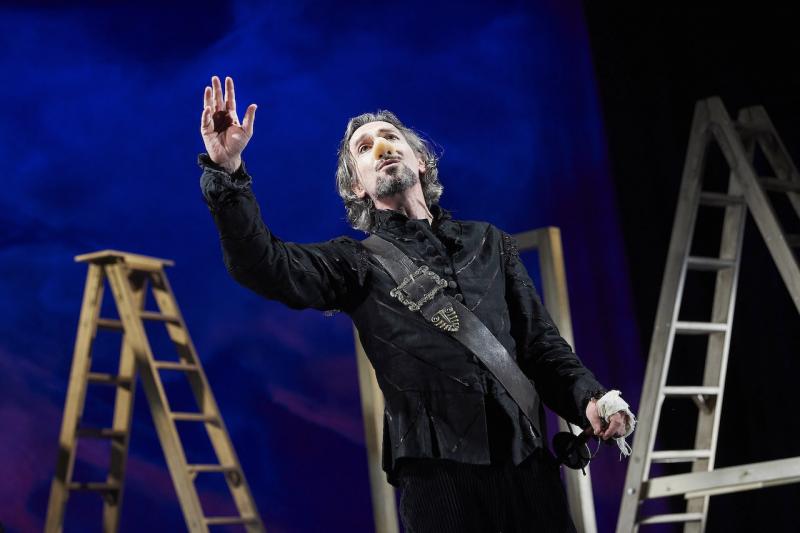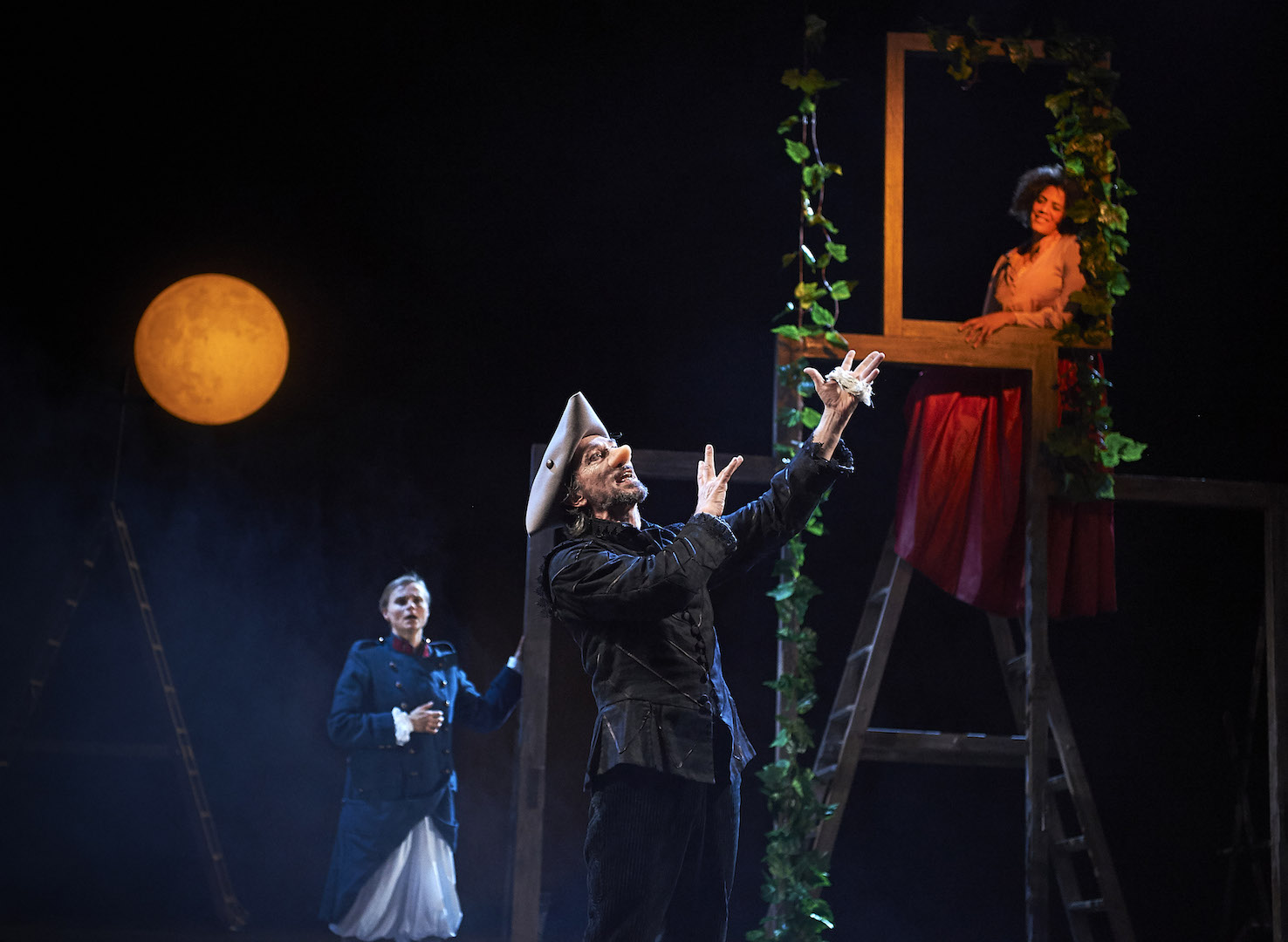Cyrano, Bristol Old Vic review – comedy with emotional intelligence | reviews, news & interviews
Cyrano, Bristol Old Vic review – comedy with emotional intelligence
Cyrano, Bristol Old Vic review – comedy with emotional intelligence
Tristan Sturrock's lead performance brings energy matched by depth

Tom Morris’s production of Cyrano starts with a procession of nuns, some of them bearded, chanting verses from the medieval mystic Hildegarde of Bingen.
In the original story, Roxanne, Cyrano’s great and unreachable love, is found in a nunnery, reflecting on the tragedy of her life. Morris and Oswald have skilfully opened and closed the narrative in the convent, so that the story is told in flashback, a device that works well as an evocation of imagination and memory. As everything else in a show that owes a great deal to the mercurial style of Kneehigh and the physical theatre of Jacques Lecoq, the nuns are shape-shifters, who double up as stage-hands and morph into the main characters of the original play.
Morris and Oswald have skilfully opened and closed their roller-coaster of a take on the narrative with scenes in the convent. The story is told in flashback, a device that works well as an evocation of imagination and memory. As everything else in a show that owes a great deal to the mercurial style of Kneehigh and the physical theatre of Jacques Lecoq, the nuns are shape-shifters, who double up as stage-hands and morph into the main characters of the original play.
Shape-shifting lies at the heart of a production that celebrates the endless transformations that the "play" of theatre affords, but for the first 20 minutes or so, the almost manic shifts in perspective and multiple incarnations of the seven-strong cast of actors make for a certain amount of confusion. It isn't easy to follow the story, unless you're familiar with the essential elements of Rostand’s play: a heroine, Roxanne, who is worshipped by several men, including the Comte de Guiche, Christian de Neuvillette, and Cyrano de Bergerac himself. The chaos eventually subsides, as Cyrano makes his entrance: charismatic Tristan Sturrock who plays him to something near perfection, provides an instant and lasting point of identification, both emotional and narrative.
Sturrock manages the lead character's mix of bravado and vulnerability, boasting and self-torturing awareness with great skill. There is a command of movement that enables his body to speak as eloquently as the poetry he throws out with consummate ease. He communicates the tragedy of a fine mind and subtle wit trapped in an inescapably flawed body – in this case his monstrous and laughable nose – with a sensitivity that is deeply human, and never mere caricature. As he finds himself helping his rival Christian conquer Roxanne, by ghost-writing his live poems and voicing his words of seduction, we share fully in his inevitable and hopeless frustration. Young Christian is handsome, but as Peter Oswald puts it, in his modernised version of Rostand (and alluding to the Sex Pistols) “pretty vacant”. He's played with the right dose of bemused guilessness by Patrycja Kujawska (pictured below left).

Much of the production’s strength lies in the interplay of the actors, all of them versatile and funny. They have worked together before and are close to Morris and his inventive designer Ty Green. This is work that has been created through intense collaboration in rehearsal, not just the interpretation of a text. The effervescence the ensemble bring to the work is palpable, their musical skills varied and exploited with natural grace. Oswald’s speciality is commedia dell’arte, and Tom Morris is a master at mixing depth and fun, as well as exploiting theatre’s potential as a vehicle for the poetic imagination. This Cyrano is very much the Capitano of the commedia, an outsider, a self-promoting swashbuckler, as well as a cunning opponent of authority. This version of the Capitano is attaching because he is so much more than the more predictable character of the Italian comedy tradition: Sturrock’s voyage through the vagaries of love, full of the erotic fantasy and restless energy that is reflected in his priapic nose, displays all the ups and downs familiar to anyone who has suffered from an unrequited yearning.
The fantasy that lies at the heart of the Cyrano story, might easily provoke a desire to play around with forms in an excessive way, theatrical gimmicks to the fore, and form upstaging content. Tom Morris's production is endearingly playful but always at the service of the psychology and philosophical reflection that make the play such a classic. The importance of words that emerge from the heart and are crafted by the imagination, as Peter Oswald point out in his programme notes offer a kind of ‘redress’ from the inexorable tragedy at the core of a story with a deeply melancholy dénouement. Tristan Sturrock - and Sara Powell as Roxanne (pictured above right) – handle the sadness of missed opportunities with great presence and authenticity.
The pace and drama are handled with such invention, energy and sparkle, and a mostly well-judged sense of timing, that some of the moments of respite, while no doubt necessary, hold back both action and emotional development. This is a question of balance, which undermines what would otherwise be a show that deserves the highest of praise.
rating
Share this article
The future of Arts Journalism
You can stop theartsdesk.com closing!
We urgently need financing to survive. Our fundraising drive has thus far raised £49,000 but we need to reach £100,000 or we will be forced to close. Please contribute here: https://gofund.me/c3f6033d
And if you can forward this information to anyone who might assist, we’d be grateful.

Subscribe to theartsdesk.com
Thank you for continuing to read our work on theartsdesk.com. For unlimited access to every article in its entirety, including our archive of more than 15,000 pieces, we're asking for £5 per month or £40 per year. We feel it's a very good deal, and hope you do too.
To take a subscription now simply click here.
And if you're looking for that extra gift for a friend or family member, why not treat them to a theartsdesk.com gift subscription?
more Theatre
 Othello, Theatre Royal, Haymarket review - a surprising mix of stateliness and ironic humour
David Harewood and Toby Jones at odds
Othello, Theatre Royal, Haymarket review - a surprising mix of stateliness and ironic humour
David Harewood and Toby Jones at odds
 Macbeth, RSC, Stratford review - Glaswegian gangs and ghoulies prove gripping
Sam Heughan's Macbeth cannot quite find a home in a mobster pub
Macbeth, RSC, Stratford review - Glaswegian gangs and ghoulies prove gripping
Sam Heughan's Macbeth cannot quite find a home in a mobster pub
 The Line of Beauty, Almeida Theatre review - the 80s revisited in theatrically ravishing form
Alan Hollinghurst novel is cunningly filleted, very finely acted
The Line of Beauty, Almeida Theatre review - the 80s revisited in theatrically ravishing form
Alan Hollinghurst novel is cunningly filleted, very finely acted
 Wendy & Peter Pan, Barbican Theatre review - mixed bag of panto and comic play, turned up to 11
The RSC adaptation is aimed at children, though all will thrill to its spectacle
Wendy & Peter Pan, Barbican Theatre review - mixed bag of panto and comic play, turned up to 11
The RSC adaptation is aimed at children, though all will thrill to its spectacle
 Hedda, Orange Tree Theatre review - a monument reimagined, perhaps even improved
Scandinavian masterpiece transplanted into a London reeling from the ravages of war
Hedda, Orange Tree Theatre review - a monument reimagined, perhaps even improved
Scandinavian masterpiece transplanted into a London reeling from the ravages of war
 The Assembled Parties, Hampstead review - a rarity, a well-made play delivered straight
Witty but poignant tribute to the strength of family ties as all around disintegrates
The Assembled Parties, Hampstead review - a rarity, a well-made play delivered straight
Witty but poignant tribute to the strength of family ties as all around disintegrates
 Mary Page Marlowe, Old Vic review - a starry portrait of a splintered life
Tracy Letts's Off Broadway play makes a shimmeringly powerful London debut
Mary Page Marlowe, Old Vic review - a starry portrait of a splintered life
Tracy Letts's Off Broadway play makes a shimmeringly powerful London debut
 Little Brother, Soho Theatre review - light, bright but emotionally true
This Verity Bargate Award-winning dramedy is entertaining as well as thought provoking
Little Brother, Soho Theatre review - light, bright but emotionally true
This Verity Bargate Award-winning dramedy is entertaining as well as thought provoking
 The Unbelievers, Royal Court Theatre - grimly compelling, powerfully performed
Nick Payne's new play is amongst his best
The Unbelievers, Royal Court Theatre - grimly compelling, powerfully performed
Nick Payne's new play is amongst his best
 The Maids, Donmar Warehouse review - vibrant cast lost in a spectacular-looking fever dream
Kip Williams revises Genet, with little gained in the update except eye-popping visuals
The Maids, Donmar Warehouse review - vibrant cast lost in a spectacular-looking fever dream
Kip Williams revises Genet, with little gained in the update except eye-popping visuals
 Ragdoll, Jermyn Street Theatre review - compelling and emotionally truthful
Katherine Moar returns with a Patty Hearst-inspired follow up to her debut hit 'Farm Hall'
Ragdoll, Jermyn Street Theatre review - compelling and emotionally truthful
Katherine Moar returns with a Patty Hearst-inspired follow up to her debut hit 'Farm Hall'
 Troilus and Cressida, Globe Theatre review - a 'problem play' with added problems
Raucous and carnivalesque, but also ugly and incomprehensible
Troilus and Cressida, Globe Theatre review - a 'problem play' with added problems
Raucous and carnivalesque, but also ugly and incomprehensible

Add comment